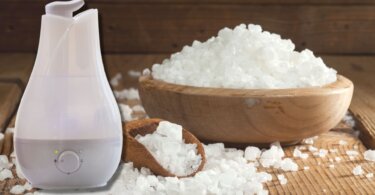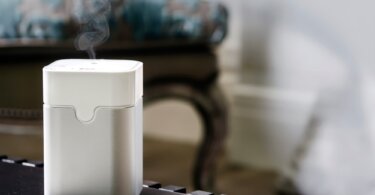As the weather transitions from hot to cold, people start shortlisting ways to make their bedrooms more comfortable. At this point, a question often pops up: can you sleep with a fan and humidifier on, or is it risky? If you’re wondering the same thing, here’s your answer:
It is perfectly safe to use a fan and humidifier simultaneously. Many people find that using both devices can help improve their sleep quality by creating a comfortable, ideal environment.
Of course, as with any electrical device, there are some potential safety concerns. Always ensure that your fan and humidifier are properly plugged into grounded outlets and away from any water sources. Additionally, keep an eye on the humidifier to ensure it doesn’t overfill and start leaking onto your floor or furniture.
But there’s more to the fan-humidifier combo, and you should explore all aspects before making this pair your summer go-to. Let’s explore whether or not it is safe to sleep with a fan and humidifier on at the same time.

Can You Use a Ceiling Fan And The Humidifier At The Same Time?
Yes, you can sleep with a ceiling fan and humidifier on simultaneously. Fans can circulate air and keep the room cool, promoting better sleep. However, if the fan is pointing directly at you, it can cause you to feel cold and wake up at night. When you pair the fan with your humidifier, it improves indoor air’s moisture levels.
Cool mist humidifiers add moisture to the air, which can be helpful if your nose and throat are dry. Also, if you suffer from seasonal allergies and nasal congestion, your warm mist humidifier can improve the indoor air quality around you.
The increased humidity can also help to loosen congestion and make breathing easier. However, if your central humidifier isn’t clean, running it alongside the fan can create an ideal environment for mold and allergy flareups. So, if you must run your humidifier during sleep, here are a few things to keep in mind:
- The humidifier should be placed close to the bed so the moist air can reach your skin and lungs.
- Make sure the fan is blowing away from you, so you don’t breathe in the humidity.
- If you’re using cold water in the humidifier, it’s important to use a room thermometer to ensure your bedroom doesn’t get too cold. You may need to adjust the fan’s speed or turn it off altogether if the room gets too cool and there’s excess moisture in the air.
With these factors in mind, you can maintain adequate moisture conditions in your place and enjoy good sleep quality.
Does the Fan “Cancel Out” Your Humidifier?
If you’re using a humidifier to combat dry air, you might be wondering if a fan will cancel out its impact. The answer is, that it depends. If you’re using the right-sized humidifier for your room and there’s some ventilation, then a fan won’t diminish the effects of the humidifier.
However, if your room is poorly ventilated or if the humidifier isn’t sized properly, the fan could make things worse by increasing evaporation and circulating the dry air. Generally, it’s best to maintain good ventilation and use air humidifiers to ensure acceptable moisture levels in your place.
Also, read Are Tower Fans Better or Pedestal Fans?
Benefits of Running The Humidifier-Fan Combo
Did you know there are specific benefits to running the humidifier and fan together? Let’s outline the benefits and how you can reap those benefits for yourself. Get ready to stay cool and prevent adverse health impacts of bad air quality with your humidifier.
1. Prevent Over-Humidity
The primary advantage of using different types of humidifiers and fans simultaneously is that they prevent over-humidification. When the air is too humid, it’s hard for the body to cool itself by sweating.
This is because sweat doesn’t evaporate as quickly in moist air, leading to overheating and dehydration. A fan can help speed up the evaporation of sweat, while a humidifier will add moisture to the air and prevent it from becoming too dry.
Using a humidifier and fan together will help keep you cool and hydrated during hot weather.
2. Better Ventilation
Using a humidifier and fan simultaneously can improve a room’s ventilation. Here’s how it works:
The humidifier adds moisture to the air, which can help reduce static electricity and make dust and other particulates less likely to suspend in the air. The fan circulates the air and helps distribute the humidity evenly throughout the room.
Together, these two devices can help improve your indoor air quality by making it more difficult for airborne contaminants to circulate. In addition, the increased humidity can help prevent stuffy nose, dry throat, itchy skin, and allergy symptoms resulting from dust mite growth or bacteria growth.
Related article: Best Humidifiers for Hard Water
Conclusion
You can run a fan and humidifier together, but it’s essential to do so with caution. Since a fan can distribute moisture from a humidifier around the room and make it easier for mold to develop, be sure not to run them both overnight. This is especially true if you have allergies or asthma.
If you want cool air while sleeping with your steam humidifier on, try running each appliance separately or placing them in different rooms so that one doesn’t disturb the other.
Lastly, use a hygrometer to ensure adequate moisture levels and enjoy the health benefits of a humidifier. Suppose weather changes worsen your health issue (dry airways, bloody noses, blocked nasal passages, and itchy throat are a few noteworthy ones).
In that case, you must maintain adequate moisture levels in your place to enjoy a good night’s sleep.
FAQs
What Happens If You Add Too Much Humidity To A Room?
If you add too much humidity to a room, it can cause condensation to form on surfaces. This can lead to mold and mildew growth and can also cause damage to paint and furnishings.
Also, increased air moisture levels result in nasal congestion, runny nose, sore throat, and other allergy reactions. It’s important to control the level of humidity in your home to prevent these health issues from occurring.
How Do I Know If My Humidity Is Too High?
There are a few things you can do to determine if your room’s humidity is too high. One way is to see if there is any condensation on the windows or walls.
Another way is to use the humidifier’s built-in hygrometer to measure the level of moisture in the air. If the humidity level is above 60%, it is generally considered too high. Lastly, you can ask yourself if you feel comfortable in the room – if you feel sweaty or clammy, the humidity is too high.
Related articles:





Leave a Comment